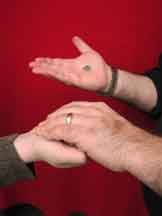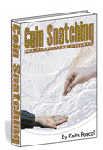
Articles
Coin Magic:
When Small Coins Are Better
by Kip Pascal
|

When is Coin Magic Better with a Small Coin?In another article, I teach that using bigger coins are more visual, and almost always the better choice for coin magic.So, when is it better to use a very small coin? The answer is ... use a small coin when whatever coin magic you are performing would appear more impressive or difficult by doing so. You increase the coin size, when you want the magic to be more visual. You decrease the coin size to add an element of difficulty.
Practical Coin Magic ExampleLet's use different coin-snatching effects as an example:In the Upside-Down Impossible Coin Snatch, you build on the impossibility of the task of stealing a coin from a volunteer's hand before the hand can close. You provide four or five elements of the effect that make the coin grab impossible. Why not have one of the elements be the miniscule size of the coin. You can even point out that the task is possible the way they do it on tv, with a large pebble, that protrudes from the palm. But with a flat coin, the grab becomes significantly harder. And with a small coin, the coin fits in the pocket of the palm of the hand, which makes the trick doubly difficult. Impossible.
When Offered a Choice of CoinsIf you wanted to present the difficulty of the task being related to the size of the coin in other coin snatches, like The Rochester Switch or Kip's Take, I suggest that you do it in an offhanded manner.Wait, until someone offers you a choice of coins for your coin magic. Then make a quick comment about it being easier with bigger coins ... so, you'll do it with a smaller one. Of course, have a plausible reason why it's harder with a smaller coin.
ConclusionYou can try the "small-coin-makes-the-trick-harder" explanation with other coin magic as well. Just make sure you give them a reason why.Some people classify coin snatching as a stunt, rather than magic. So, you might be thinking that this explanation would only work for stunts, where you want it to appear "difficult to accomplish." This wouldn't work for coin magic, because magic is supposed to appear effortless. Right? This tactic does work for coin magic, too. The ghost has a harder time locating a smaller coin. Magic isn't delicate. Sometimes it's easier to vanish a big ball than a small coin. We'll confuse the genii by using a handful of small coins (Calvert's Claw), instead of one large one.
You get the idea. So, why would I (or you) want to use this strategy with coin magic? Easy. When you don't have a larger, more visual coin. If you have to use a small coin, why not build it into a benefit?
Magicians who appreciate the above article also enjoy -- My Coin Is Bigger Than Yours.
Kip Pascal is the author of Coin Snatching: The Reputation Builder.
Yes, this book has great coin tricks ... all around the theme of coin snatcihng and switching. Check out this special deal ... you get the hardback book and a bunch of bonuses with this special offer. Tell me more about Coin Snatching: The Reputation Builderr. |
|
|
Kerwin Benson Publishing
2749 Friendly St., Suite Q
Eugene, Oregon 97405
USA
 Not only do you get a book filled with the strongest coin snatches and switches around, but you get detailed instructions on how to let others build your reputation as a magician for you. No kidding.
Not only do you get a book filled with the strongest coin snatches and switches around, but you get detailed instructions on how to let others build your reputation as a magician for you. No kidding.